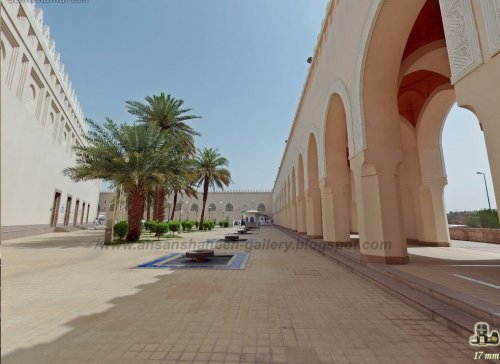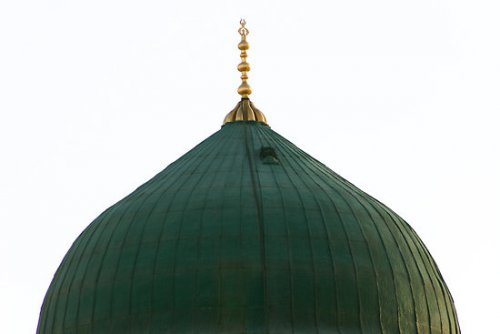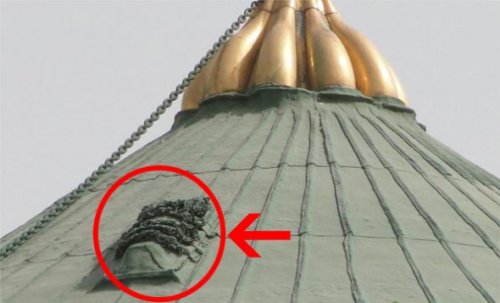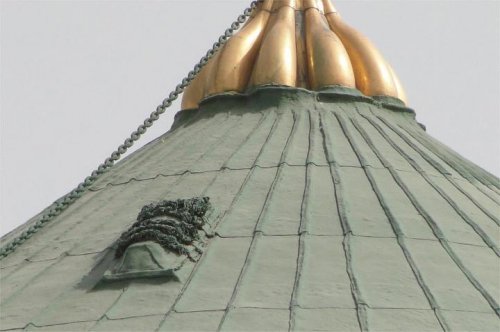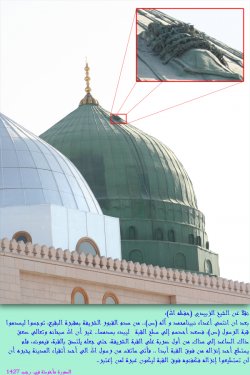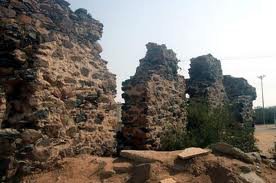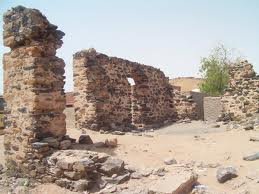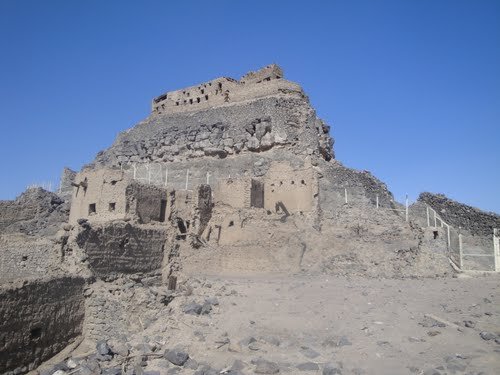-
Posts
8,434 -
Joined
-
Days Won
771
Content Type
Profiles
Forums
Events
Everything posted by ummtaalib
-
QUESTION> Is it permissible to use mobile in mosques with Islamic tunes. In Masjid-E-Khaif (in Mina) during Haj women stay in women's mosque whereas men stay in men's mosque (usually those who live in K.S.A and go on their own not through any agent). It becomes easy to contact one's mahram on mobile, though man can go at the door of women's section and tell his name to guard and then He/She can call his name on loud speaker. <ANSWER> In the name of Allah, Most Compassionate, Most Merciful, It is not appropriate to use cell phones in Masjids, unless absolutely necessary, for in entails disturbing those who are engaged in worship (ibadah). To harm and disturb another individual is a sin in itself, let alone when one is engaged in an Ibadah, such as offering Salat. Allah Most High says: “And those who annoy believing men and women undeservedly bear (on themselves) a calumny and a glaring sin.” (Surah al-Ahzab, V.58) And: “And who is more unjust than he who forbids that in places for the worship of Allah, Allah’s name should be celebrated.” (al-Baqarah, V. 114) The solution to the problem in Hajj is that, one may contact one’s family by going out of the Masjid and using the phone. The one who is being contacted should keep his/her phone silent, as not to disturb others who are engaged in worship. Thereafter, he/she may go out of the Masjid and answer the call. And Allah knows best [Mufti] Muhammad ibn Adam Darul Iftaa Leicester , UK
-

WOMEN - Covering The Face Of A Woman In The State Of Ihram Q/A
ummtaalib replied to ummtaalib's topic in Hajj/Umrah
Is it necessary for a woman to cover her face during Ihram <QUESTION> Is it necessary for a woman to cover her face during Ihram (during Umrah/Hajj)? Will she be excused for not covering her face due to the difficulties associated with niqabs hanging from baseball caps? Inshallah as soon as my state of Ihram is complete, I would wear the Niqab but what about during the days of ihram? <ANSWER> In the name of Allah, Most Compassionate, Most Merciful, The ruling in the Hanafi Madhhab (and even in other madhhabs) is that, although the face is not considered to be part of one’s nakedness (awra), it is necessary to cover it, due to the fitna involved in not doing so. This is the transmitted position in the Hanafi School, as mentioned in virtually all the major fiqh books. Some contemporary scholars have a more lenient approach to this issue, especially for the West. However, my understanding is (according to what I have learnt from my teachers) that a woman is required to cover her face even in the west except in dire situations. As such, if you are travelling for Hajj, and you normally cover your face at home, you must cover it whilst in the state of Ihram also. This covering must be done in a way that the Niqab does not touch the face, such as wearing a cap, etc… Indeed a woman must not have a cloth whilst in Ihram that touches her face. However, at the same time, she should avoid exposing her face in front of non-Mahram men, especially when she is young and when the risk of Fitna is greater. As such, in the presence of non-Mahram men, she should cover her face in a way that no clothing touches her face, by wearing a cap or something else. Even in the days of the Messenger of Allah (Allah bless him & give him peace), the female Companions (Allah be pleased with them) abstained from exposing their faces in front of non-Mahram men. Sayyida A’isha (Allah be pleased with her) narrates that, the (caravan of) riders would pass by us whilst we were in the state of Ihram in the company of the Messenger of Allah (Allah bless him & give him peace). When they got close to us, we would draw our outer cloak from our heads over our faces (m, without letting it touch the face) and when they passed by, we would uncover our faces.” (Sunan Abu Dawud, no. 1826) However, if it becomes very difficult, in that it becomes virtually impossible to wear the niqab (even with a cap, etc), and you fear harm onto yourself, then in such a case you will be excused in leaving the face exposed, but try to keep the face away from non-Mahram men whenever reasonably possible. And Allah knows best [Mufti] Muhammad ibn Adam Darul Iftaa Leicester , UK -
<QUESTION> Is it permissible for a male to wear a piece of cloth as underwear under the Ihram or is it forbidden? <ANSWER> In the name of Allah, Most Compassionate, Most Merciful, Almost all of the major books in the Hanafi Madhhab are unanimous on the fact that, it is impermissible for a male who is in the state of Ihram to wear something that is sewn, stitched or knitted to the shape of one’s body. Imam al-Haskafi (Allah have mercy on him) states: “After one has made the intention of Ihram, one must refrain from……wearing a shirt, trousers, meaning any clothing that is made in proportion to the shape of the body or part of the body, such as pliers (zardiya) and a cloak.” The great Hanafi Imam, Allama Ibn Abidin (Allah have mercy on him) explains: “This refers to the prohibition (of wearing) anything that is sewn….And it is related in al-Bahr from Ibn Amir Haj al-Halabi, that the criterion in this regard is that, it will not be permissible to wear anything that is made in proportion to the shape of the whole body or part of the body, in a way that it wraps and surrounds the body (or part of it) due to the sewing, joining parts of the clothing to one another or by any other means, and that it stays upright on the body itself by merely wearing it.” (Radd al-Muhtar ala al-Durr, 2/489) It is stated in al-Fatawa al-Hindiyya: “A person in Ihram must not wear anything that is sewn, such as a shirt, cloak, trousers, turban, or socks...And the unlawful sewn clothing is that which is normally worn.” (al-Fatawa al-Hindiyya, 1/224) The meaning of the above (and other) statements is that, any type of clothing that is either sewn, stitched, knitted, wedged, hemmed, weaved or joined in any other way, to the shape of the whole body or to the shape of an organ of the body, it will not be permissible to wear it. Thus, it will not be permissible for a male who is in the state of Ihram to wear a ghallabiyya (or jubba), shirt, trousers, vest, top, sweater, underwear, shorts, cloak, coat, hat, headgear, turban, gloves, and socks, for all of the above fall within the criterion explained above. However, there is no harm in having stitched patching to the Ihram sheets as well as sewing of the loin in the middle, for this is not stitched or sewn to the shape of the whole body. One may also wear slippers under the condition that the bone on the foot where the shoelace is normally placed, remains exposed. If one does not have such slippers, it will also be allowed to cut the socks to the extent of that bone and then wear them. (See: Radd al-Muhtar, 2/490 & other fiqh references) With the above, I hope your query has been answered. And Allah knows best [Mufti] Muhammad ibn Adam Darul Iftaa Leicester , UK
-
One never tires of gazing at the sight of the House of Allah, the Kaa'ba. The site upon which the mercy and blessings of Allah are constantly descending. There is truly nothing comparable to the House of Allah on this Earth. People wish time would stand still so they could keep gazing at the Kaa'ba; their thirst is never quenched, rather it increases. Once, while on a visit to Washington, people told me that a woman had accepted Islam and had some questions for me. They told me that many non-practicing Muslim women had started practicing again due to her. At prayer time she would dress in her best clothes as if readying herself for someone special, and would become oblivious to everything around her as soon she started praying. After a brief question and answer session, I asked her what prompted her to accept Islam. She sighed and started explaining; "I was a Jew and my husband was a Christian who was posted in Saudi Arabia for some technical work. Everyday I used to see Muslim men and women dressed in white on their way somewhere. I asked my husband where they were going and he told me that they go to perform pilgrimage at the Muslim shrine of Kaa'ba. I expressed a desire to go but he told me that non-Muslims were not allowed. However, I was determined and so we both bought white clothes and set out. Fortunately no one stopped us and we reached Makkah, from where we found directions to the Kaa'ba. Upon seeing the Kaa'ba our eyes froze and time seemed to stand still. When we turned to look at each other after some time, we were both crying. With our eyes we told each other that this was the Truth and we should accept Islam. No one ever told me about Islam, but there were so many blessings descending on that House that they changed my life forever." The blessings of Tawhid descend in Makkah, and the blessings of Prophethood descend in Madinah. One has seen nothing in life if he has not seen these two holy sites. May Allah give all Muslims the opportunity to visit to His House. Source: Excerpt from a speech of Shaikh Zulfiqar - sacredlearning.com
-
Darb Zubayda These three photos show the remains of the magnificent aqueduct known as Darb Zubayda. Zubayda bint Ja`far ibn Mansur (d.791A.D.) was daughter of the Abbasid caliph Al-Mansur, and cousin of Harun al-Rashid (r.766-809 A.D.), whom she later married (781A.D.). She was the best known of the Abbasid princesses. She and her husband’s exploits are the subjects of The Thousand and One Nights. It is said that her palace ’sounded like a beehive’ because she employed one hundred women maids who had memorized the Qur’an. She is particularly remembered for the contributions she made to the ulema and the poor, and for the series of wells, reservoirs and artificial pools that provided water for Muslim pilgrims along the route from Baghdad to Mecca and Medina. The route was re-named Darb Zubayda, “Zubayda’s Way”. At its height, the route included milestones, 54 major way stations with cisterns, reservoirs or wells, fire signal towers, hostels and fortresses—all paid for by the Abbasid treasury. The people of Makkah received water from this canal for twelve hundred years, with Muslim rulers continuing to repair and maintain it through the centuries until it eventually started to break up. In parts, the monumental stone artistry still seems intact, after all these years of harsh conditions. Going back to the previous post on Arafat, you will notice this same aqueduct surrounding the base of Jabal Rahmah. The views of it hugging the mountain sides, and winding around valleys as a ribbon around a parcel is awesome, and more so given the harsh nature of the landscape it traverses. Harun al-Rashid ruled from 786 to 809. He performed Hajj six or nine times, including the one in 790 which, in fulfillment of a vow, he made entirely on foot. His final one, performed in 804, was the last Hajj ever made by a caliph. It is recorded that a field of carpets would be rolled out on the sand before them each day of traveling! Zubayda made five or six pilgrimages herself. Apart from patronizing the incredible engineering feat of the aqueduct she is also honoured for her efforts in established an abundant drinking water system in Makkah at the time. One of dozens of maintained rest and water stations on the pilgrim road from Iraq to Makkah, this pool at Aqiq, Saudi Arabia, still holds water more than a thousand years after it was constructed under the patronage of Zubayda. Al-Miskeenah
-
Masjid-e-Miqaat (Zul Hulaifah) This Masjid is Situated Twelve Kilometers Away From Madinah and it is Declared as Meeqat for Pilgrims. Here a Well is Present Which is Called Ali's Well And The Place is Also Called as Abyar-e-Ali. All Buses / Vehicles Going to Makkah Stop Here And Pilgrims Change Into Ihram A Beautiful place to stop and enter Ihraam. There is a beautiful women's section and ample baths/toilets and changing rooms.
-
The status of women cannot be questionable as Islam has given rights and privileges to women which they never had in other religions. But still nowadays the most common attack on Islamic morals and values is to question the status of women in Islam. The status of women in Islam is unique and does not have any similarity with previous systems or religions. Let us discuss the status of women in Islam with regard to the history of Safa and Marwa. Safa and Marwa are two hills close to Kaaba in Makkah. Muslims who perform the Hajj must run between Safa and Marwa. This is in memory of a mother’s sacrifice for her son. The great woman was Hajira (May Allah be pleased with her). She was the wife of Prophet Ibrahim (A.S). Haajar/ Hajira was the daughter of king of Egypt and Her son was Prophet Ismael (A.S). Hajira’s sacrifice took place when she was left alone with her baby in the valley of Makkah all for the sake of Allah. Ibn Abbaas (R.A) narrated the story of Haajar/Hajira, the wife of Ibraheem and the mother of his son Ismaeel. He said: Ibraheem brought Hajira and her son Ismaeel while she was suckling him, to a place near the Kabah under a tree on the spot of Zamzam, at the highest place in the mosque. During those days there was nobody in Makkah, nor was there any water. So he made them sit over there and placed near them a leather bag containing some dates, and a small water-skin containing some water, and set out homeward. Hajira followed him saying: “O Ibraheem! Where are you going leaving us in this valley where there is no person whose company we may enjoy, nor is there anything?” She repeated that to him many times, but he did not look back at her. Then she asked him: “Has Allah ordered you to do this?” He said, “Yes.” She said, “Then He will not neglect us” and returned while Ibrahim went on his way. When he reached al-Thaniyyah, where they could not see him, he faced the Ka’bah, and raising both hands, prayed to Allah in the following words: “O our Lord! I have made some of my offspring to dwell in an uncultivable valley by Your Sacred House (the Kaabah at Makkah) in order, O our Lord, that they may perform As‑Salaah (Iqaamat‑as‑Salaah). So fill some hearts among men with love towards them, and (O Allah) provide them with fruits so that they may give thanks”[ Ibraaheem 14:37] Ismaeel’s mother went on suckling Ismael and drinking from the water (she had). When the water in the water-skin had all been used up, she became thirsty and her child also became thirsty. She started looking at her child tossing in agony. She left him, for she could not endure looking at him, and found that the mountain of al-Safa was the nearest mountain to her on that land. She stood on it and started looking at the valley keenly so that she might see somebody, but she could not see anybody. Then she descended from al-Safa and when she reached the valley, she tucked up her robe and ran in the valley like a person in distress and trouble, till she crossed the valley and reached al-Marwa where she stood and started looking, expecting to see somebody, but she could not see anybody. She repeated that (running between al-Safa and al-Marwa) seven times. Ibn Abbaas said: the Prophet (P.B.U.H) said: “This is the source of the tradition of the walking between them (i.e. Safa and Marwa). When she reached Marwa (for the last time) she heard a voice and she asked herself to be quiet and listened attentively. She heard the voice again and said, “O (whoever you may be)! You have made me hear your voice; have you got something to help me?” And she saw an angel at the place of Zamzam, digging the earth with his heel (or his wing), till water flowed from that place. She started to make something like a basin around it, using her hand in this way, and started filling her water-skin with water with her hands, and the water started flowing out after she had scooped some of it.” Ibn Abbaas said: The Prophet (P.B.U.H) added: “May Allah bestow Mercy on Ismael’s mother! Had she left the Zamzam alone (flowing without trying to control it) (or had she not scooped from that water) (to fill her water-skin), Zamzam would have been a stream flowing on the surface of the earth.” The Prophet (P.B.U.H) further added, “Then she drank (water) and suckled her child. The angel said to her: ‘Don’t be afraid of being neglected, for this is the House of Allah which will be built by this boy and his father, and Allah never neglects His people’ This act of running between Safa and Marwa by a woman was so much loved by Allah that Allah has made running between Safa and Marwa compulsory for every man and Woman who performs Hajj. Allah mentioned in Quran: “Behold! Safa and Marwa are among the Symbols of Allah” [surah Baqara:158] Today we drink from Zamzam and it is ever flowing water. When you go for Hajj, remember the struggle of this great woman. What a great example of Status of women in Islam!!
-
Contemplating On Being A Second Wife? A SECOND WIFE, in fact even a third and a fourth wife, are in exactly the same category as a first wife. The norms of western society, which have been acquired by Muslims, have created in Muslim society similar attitudes of repugnance which westerners display towards a plurality of marriages. In the Qur’aan Majeed and in the Sunnah there is overwhelming evidence for the perfect permissibility of marrying more than one wife. The life of Rasulullah (sallallahu alayhi wasallam), of the Sahaabah and the great personalities of Islam in all ages are more than adequate evidence for the sanctity of the institution of polygamy in the same way as is the institution of monogamy. In fact, it is an attitude of kufr to hold in contempt polygamy. This attitude is tantamount to criticizing Allah Ta’ala who has made polygamy lawful, and it is an indirect assault on the practice of Rasulullah (sallallahu alayhi wasallam), the Ambiya and the Sahaabah. IMMORALITY Western society tolerates fornication and illicit associations by husbands and wives. But, a second marriage is unthinkable. Muslims who ape the west suffer from the very same irrational mental disease. Since the kufr draws filth and falsehood like a magnet draws steel, a compromise with the adultery committed by a husband and even a continued illicit relationship are acceptable to a wife. But never is a second wife tolerable to the first wife. Muslims too have inherited similar emotional stances, attitudes and ideas of the western kuffaar. Even Muslim wives and Muslims in general frown o¬n a second marriage while wives and many others outrightly reject it. As a last resort to prevent the second marriage, the husband’s continued illicit relationship will be condoned with a blind eye, but not his Nikah which is viewed worse than adultery— Nauthubillaah! OPPOSITION In view of the strong opposition of society and the wife in particular to a man marrying a second wife, most men who become entangled in illicit relationships, but are overwhelmed by remorse, endeavour to rectify the wrong in a clandestine way. Since they lack the courage to do what is proper, they enter into secret marriages. Clandestine marriages bring in their wake grave and heartbreaking consequences. Both the man and woman who contemplate such a marriage should reflect seriously and not enter into a union which resembles an illicit relationship. In other words, they should not enact a secret Nikah and conceal the holy bond from the community and the first wife. The opposition, taunts and criticism of society should be ignored. The Pleasure of Allah Ta’ala is of paramount importance, not the emotional eruptions and pleasure of the people. Deficiency of Imaan constrains men who contemplate second marriages to either opt for continuation of the illicit affair for fear of antagonising the first wife and society, or at best, they arrange a secret Nikah. THE SECRET NIKAH Nikah, it should be understood, is a public institution. The teaching and spirit of Islam emphasise the public announcement of a Nikah. That is why the presence of witnesses is an integral constituent of the marriage ceremony which is not valid without witnesses. The public announcement of Nikah is of such great significance that according to the Maaliki Math-hab, it should be proclaimed and advertised with even the beating of the duff (drum). The Hadith states that the distinguishing feature between Nikah and zina is public announcement. While Nikah is publicly proclaimed and acclaimed, zina is concealed. Now if Nikah too is treated with secrecy, what difference is there between marriage and adultery? It therefore does not behove Muslims to conceal what is above board, pure and halaal. Concealing an illicit association is understandable, but not a halaal union enacted to obliterate the illicit affair. A marriage performed in secret and concealed from public knowledge is in conflict with the teaching and spirit of Islam. NOT FOR LONG A secret marriage cannot be concealed for too long. Sooner or later the matter comes to the notice of people. Those who are unaware will justifiably believe that an adulterous affair is existing. When ultimately the Nikah becomes known, a storm erupts. If the Nikah was performed in accordance with the demands of the Shariah, the resultant effect would have been infinitely milder than the consequences of a secret marriage becoming public. MISTRESS? The woman too should understand that she should not submit to the demanding emotions of the married man who is desirous of concealing the contemplated Nikah. It is most dishonourable for a woman to allow herself to be entrapped in such a marriage in which her position will be not much better than that of a mistress. While married, life will continue as if an illicit affair exists between herself and her husband. What pleasure and happiness can an honourable Muslim woman derive from a marriage which she has to conceal, and always duck and dive to save her ‘image’ and the ‘reputation’ of her husband? Over the years numerous such clandestine cases have passed through our office. The results are always miserable and grievous. A woman who accedes to a man’s desire for a clandestine nikah should understand that she will not be treated as a decent wife by her husband. She will live in suspense. She will not be favoured with the rights which a Nikah grants a wife. She will be denied the honour of running a home. The husband will violate most of her rights. She will live in frustration and despondency. Although a wife, wedded to her husband in Allah’s Name, she has to live in darkness and under a cloud of suspicion. NEGLECT After a lapse of time, the man tires of his secret wife. The glamour must necessarily wear thin. Then the serious problems begin. The woman comes to her senses when it is a bit too late. Never submit to a secret marriage proposal. If a man lacks the courage to publicly proclaim his second marriage, it is a sure sign that he will violate the rights of his second wife. He lacks in the quality of Islamic manhood. He marries her to soothe his conscience. His sole motive is sexual gratification. But a happy marriage is not based solely on this factor. If he refuses to have the Nikah in the Musjid and put you on the pedestal of Islamic wifehood, issue a firm refusal for your own sake. Do not open up the avenue of a miserable life for yourself by acting the part of a mistress under a veneer of marriage.
-
Various fatawa from Mufti A S Desai (Damat Barakutuhum): QUESTION Will a man’s Nikah be valid to more than one wife if he knows that he cannot support them? ANSWER It is permissible for a man to marry four wives. It is compulsory for him to provide equal financial expenses and equal nights to all his wives. A husband who discriminates between his wives with regard to these two aspects (support and nights) will rise on the Day of Qiyaamah with half of his body paralyzed. This is only one form of punishment. If he is unable to maintain more than one wife, then he should not marry again. However, the Nikah will be valid even if he knows that he is unable to maintain more than one wife. The effects and consequences of marriage come into existence only after Nikah. If a man gets married to a woman for the first time, i.e. she is his first wife, then too it is Waajib (compulsory) on him to support her and spend the nights with her. Just as it is compulsory to fulfil the rights of one wife, so too is it compulsory to fulfil the rights of the other wives. If a man believes that he will be unable to fulfil the rights of a second, third and fourth wife, then he should not get married to more women. However, the Nikah will be valid in the same way as the Nikah is valid with the first wife. For example, when a man married his first wife, he was fully aware at the time that he will be unable to support her financially nor afford to provide her a home. In this case too, he should not marry until such time that he can fulfil the rights of a wife. Nevertheless, if he does get married, the marriage will be valid. The same rationale applies when he marries a second wife. The Nikah will be valid. Failing to observe the rights of the wives is a separate sin. QUESTION Is it correct that a man has to treat his wives equally both financially and emotionally? ANSWER Equality applies to financial support and night times. It does not apply to the emotional aspect. It is impossible to treat wives equally in terms of emotion. The Qur’aan makes it clear that a man is not blameworthy or sinful if there is no emotional equality. It is just natural to love one wife more than the other for a variety of reasons. However, he is not permitted to display his emotional inequality to the other wives. It is not permissible for the husband to discriminate between his wives and curtail any of their rights because he may love one wife more. QUESTION Does the first wife have a say in her husband’s second marriage? Does the husband have to get her permission? ANSWER The husband does not require the consent of the first wife for marrying a second wife. No wife will grant permission. A subsequent marriage is not reliant on the consent of the existing wife. QUESTION Is it permissible for a man to marry a second and third wife only for the sake of fulfilling his sexual desires? ANSWER It is permissible for a man to marry another wife even if it is only for the sake of his sexual desires just as it is permissible to get married to one woman for the sake of sexual desire. All men marry primarily for this reason. The other aspects, e.g. procreation, caring for the women, etc., are by-products. Despite their fundamental importance, it is furthest from the minds of men when they marry. Only those with exceptionally high Taqwa have the other factors of altruism in mind. QUESTION I am a divorcee who intends getting married to a married man. My family is dead against the marriage. They say that a woman who becomes a second wife is a ‘whore’ and a ‘slut’. She brings disgrace to the ‘izzat’ (honour and respect) of the family. Please give me some advice. I am in a dilemma. Is it permissible for me to get married without their consent? ANSWER Your family is displaying a crudely un-Islamic attitude akin to kufr. They appear to be victims of Hindu culture. Their attitude and vile statements in deprecation of marrying and being a second wife are undoubtedly kufr. They have lost their Imaan with such statements and attitudes. It is necessary that they renew their Imaan and their Nikah. When Allah Ta’ala has permitted polygamy in the Qur’aan, it is clear kufr to refer to a woman as a ‘whore’, ‘slut’, etc. merely because she chooses to avail herself of a right which Allah Ta’ala has granted. By ‘disgrace’ they are implying that Allah’s Law is bringing disgrace to them. For such people who see ‘izzat’ in Hindu and other kuffaar customs, attitudes and practices, the Qur’aan Majeed says: “What! Do you search for izzat from them (kuffaar)? All Izzat belongs to Allah.” Disgrace is in the commission of haraam, and Izzat is in following Allah’s Shariah. In the circumstances ignore the haraam statements of kufr which your family members are making. You are an adult. According to Islam you can represent yourself. You don’t need anyone to represent you for Nikah. Have a small Nikah. The minimum requisites for the validity of a Nikah is the presence of two male Muslim witnesses, the bride and the bridegroom. QUESTION A 28 year old widow is prepared and desperate to get married to a pious married man. She is prepared to be his second wife and to spend only two nights a week with him. The man too is keen to marry her, but the whole community including the families of the man and the woman are against this second marriage. Will the man and the woman be sinning if they get married against the wishes of the community? ANSWER In fact, they will be getting much thawaab for ignoring the stupid and shaitaani wishes of an errant community who follows the path of shaitaan. It is the man’s Qur’aanic right to marry this woman. Marrying widows/divorcees is also perfectly permissible. While the errant community will rather condone the man committing adultery, they will not accept a sacred union, viz. Nikah. The man should ignore the wishes and criticism of the community and proceed with his new Nikah. QUESTION My second wife forbids me from spending much time with my first wife and children by her. She makes my life miserable when she discovers that I was with my first wife for any part of the day. She even insists that I spend more nights with her than with my first wife. What is the Shariah’s ruling on this issue? ANSWER The ruling is very clear and concise which every Muslim is aware of. You are required to mete out equality of financial expenses and equality of night times between your wives. It is compulsory to spend an equal number of nights with each wife. The rule of equality does not apply to daylight hours. You may apportion out the daylight hours to your convenience. It is haraam for you to submit to the unlawful dictates of your second wife. If such submission leads to violation of the rights of your first wife, you will be guilty of a major sin. You will be inviting calamities on yourself and on the Day of Qiyaamah you will be resurrected with half your body paralysed. Allah Ta’ala has made the husband the dominant one and the ruler of his home. He is not supposed to be a cuckold and submit to the haraam commands and wishes of his wives. QUESTION Does the Shariah impose any controls or restrictions on a man if he wishes to take a second and a third wife? Some argue that if a man is not wealthy, it is not permissible for him to marry a second wife. Is this correct? ANSWER Marrying a second, third and fourth wife is just like marrying a first wife. Assuming that a man who is not wealthy or who is poor is not allowed to marry a second wife, then by the same token he should not be permitted to marry a first wife. To be wealthy is not a condition for the validity or for even the permissibility of marriage, whether it be to a first, second, third or fourth wife. The husband is required to mete out equality to all his wives. This is his obligation. A faqeer (pauper) is obliged to maintain his wife. However, the Shariah does not stipulate that he first earns and saves up money, then marries. He may marry even during his state of poverty. After marriage, he has to work and ensure that he provides the expenses for his wife. The same applies to the person who marries a plurality of wives. Those who claim that the Shariah imposes restrictions on a man who wishes to marry again, are in error. They are affected by western concepts and suffer from an inferiority in thinking, which they gained from their western upbringing. QUESTION: What is the attitude of the Shariah towards a person who despises and criticizes a second, third and fourth Nikah? ANSWER: Despising or criticizing second, third and fourth marriages is an attitude of kufr. It is the product of westernism and the liberal education of universities. The following is the Fatwa o¬n this question issued by Hadhrat Maulana Rashid Ahmad Gangohi (rahmatullah alayh): "A person who finds fault with any hukm (law) of Allah Ta’ala or way of Rasulullah (sallallahu alayhi wasallam), considering it to be dishonourable and its upholder to be shameless, is undoubtedly a mal-oon (accursed), an opponent of Allah and a kaafir. He is a murtadd (renegade) and a jahannami (destined for Jahannum). Inspite of acknowledging polygamy being a hukm of Allah Ta’ala and a Sunnat, he persists in despising this hukm o¬n account of customary practice. This aggravates his kufr and opposition to Allah Ta’ala. He is an unfortunate mal-oon, for he believes his custom (the prevailing attitude of people) is better than the law of Allah Ta’ala. To sever all ties from such a person and to ostracize him are precise acts of the Deen. It is never permissible to maintain family and friendship ties with him. It is imperative to remain aloof from him. Believing him to be the most-hated creature of Allah’s creation. Become his enemy. Never perform Janaazah Salaat for him because he is a kaafir. This is recorded in the Kutub of Hadith, Fiqh and Aqaaid." This Fatwa which was ratified and counter-signed by fifty Muftis of Hadhrat Gangohi’s time, is adequate commentary of the Shariah’s attitude towards those who despise and criticize the Qur’aanic permission of polygamy. QUESTION A man married a second wife without the knowledge of his first wife. Some years later the first wife discovered this. Now she and her family are demanding that the husband divorces his second wife. What should he do? ANSWER He should do what the Shariah instructs him. He should never submit to the haraam dictates of his wife and her family. It is haraam for him to divorce his second wife to satisfy the haraam dictates of his first wife and her miserable family. They are enemies of Allah’s Deen, hence they display such kufr. QUESTION Many people say that the second wife is a home-breaker. Please comment. ANSWER It is not the second wife who is a home breaker. The kufr concealed in the heart of the first wife is the homebreaker. When a person is dissatisfied with Allah’s laws, then Allah Ta’ala constrains that person to damn himself/herself by displaying his/her kufr.
-
Return of the Pharaoh Sister Zaynab Al-Ghazali (1917-2005) who was a member of al-ʾIkḫwān al-Muslimūn and spent nearly 7 years in prison, wrote "Return of the Pharaoh" Read Blog Post READ BOOK HERE
-
What's on the Green Dome of the Prophet's Masjid? (Remember to click on the pictures to enlarge) On the Green Dome, near the top, we can see a rectangular form...what it is? A Dead Body? Let us find out what this is all about! The following is from Al-Miskeenah This is the story regarding the Green Dome circulating through forwarded emails and on the net: This is a fake one circulated by the Shi’ahs… Actually this brick was placed by the Turks in the remembrance of the incident when people came to Syedatuna Ayesha and requested her to pray for the Rain. She advised to remove the brick or the leaves or whatever was on the roof right above the Blessed Qabar Sharif of Syeduna Rasoolullah Sallallaho Alaihi wa Sallam through which ALLAH Kareem will bless us the Rain! Her advised was implemented and it start raining. So this brick is said to be right above the Qabar Sharif!! This is all what I know from my resources.. ALLAH and His Habeeb Knows Best!! A copied and pasted explanation of a brother residing here. While a Sayyed Saudi al-Madani Shaykh says it is simply wiring to do with earthing and/or acoustics/security. And Allah the Almighty knows best. Insha’Allah, if you can shed light on this do share information, or the source of the mentioned Hadith of our Lady Ayeshah RadhiAllahu anha. The Answer? If anyone has correct information please share! The following has been passed on to me which appears to be from a reliable source in Madina
-
Hudaibiyyah Masjid of Hudaibiyyah Hudaibiyyah Well Mohammad (Peace be Upon Him) with fourteen hundred unarmed companions, set out for Makkah for the pilgrimage. The Quraish however decided not to allow the Holy Prophet (Peace be Upon Him) and His companions to enter Makkah. The Holy Prophet (Peace be Upon Him), therefore stopped at Hudaibiya, a place at a short distance from Makkah. From there he sent a messenger to inform the Quraish that they had not come to wage war, but had come unarmed and wished to enter Makkah only for the purpose of performing the Umrah. The messenger sent by the Holy Prophet (Peace be Upon Him) did not return, the Holy Prophet (Peace be Upon Him) sent Hazrat Uthman. He, too, was detained by the Quraish and a rumor spread that he was killed. The Holy Prophet (Peace be Upon Him) collected all his followers near the oasis of Rizwan. He took from them the oath that they would lay down their lives in the name of Allah. This oath is known as Bait-e-Rizwan. Regarding this oath, the Quran says: “Allah’s Good Pleasure was on the Believers when they swore fealty to thee under the tree: He knew what was in their hearts, and He sent down tranquility to them: and He rewarded them with a speedy victory” (48:18) The Quraish were very disturbed when they heard of this and decided to negotiate a treaty of peace with the Muslims. It was called the Treaty of Hudaibiya. It had the following terms: Muslims would return to Madinah that year. They would be permitted to come for pilgrimage next year but would stay only for three days in Makkah. If a Quraish from Makkah should join the Muslims without permission from this guardians, he would be sent back to Makkah. But if a Muslim from Madinah went to Makkah he would not be sent back. There would be no fighting for ten years. Many of the Muslims including Hazrat Umar were not happy over the terms of the treaty which were very harsh and against the interests of Muslims. Yet the Holy Prophet (Peace be Upon Him) accepted them with the command of Allah Who Himself, declared this treaty to be a manifest victory for the believers by saying: “Verily We have granted thee a manifest victory.” (48:1) As the subsequent events show, this treaty proved to be beneficial for the cause of Islam. It ended the atmosphere of constant hostility and the non-believers of Makkah started coming to Madinah. Having free contacts with the believers, they got the chance to study closely the Islamic way of life. Large number of unbelievers accepted Islam after this treaty. This was the turning point for the Muslims and thus proved the victory later for Muslims.
-
1. Unnecessary Talking Umar Ibn al-Khattab, may Allah be pleased with him, said: "A person who talks too much is aperson who often makes mistakes, and someone who often makes mistakes, often has wrong actions. The Fire has a priority over such a frequent sinner." 2. Unrestrained Glances It has been related that the Prophet Sallallahualayhiwassallam once said words to the effect: "The glance is a poisoned arrow of shaytan. Whoever lowers his gaze for Allah, He will bestow upon him a refreshing sweetness which he will find in his heart on the day that he meets Him." 3. Too Much Food Al-Miqdam ibn Ma'd Yakrib said: I heard the Messenger of Allah say:"The son of Adam fills no vessel more displeasing to Allah than his stomach. A few morsels should be enough for him to preserve his strength. If he must fill it, then he should allow a third for his food, a third for his drink and leave a third empty for easy breathing." 4. Keeping Bad Company Allah's Apostle said: "The example of a good companion (who sits with you) in comparison with a bad one, is like that of the musk seller and the blacksmith's bellows (or furnace); from the first you would either buy musk or enjoy its good smell while the bellows would either burn your clothes or your house, or you get a bad nasty smell thereof." The Purification of the Soul By Ibn ul Qayyum al Jawziyya Source
-

An Earnest Plea For Du'as From Our Member!
ummtaalib replied to ummtaalib's topic in General Islamic Discussions
Update: On enquiry, we received the following reply Alhamdulillah! May Allah ta'ala grant them complete recovery with 'aafiyat, Aameen. -
In the present age, Allaah The Almighty has enabled us to achieve great development in the ways and means of communication for the exchange of information and ideas, especially through the internet. The creation of internet forums and social networking sites has allowed the internet to enter almost every home. As a result, many virtuous sisters have explored this amazing and wonderful world. Unfortunately, some men take advantage of the heedlessness of some women and exploit their emotions in matters that do not please Allaah The Almighty through forums, chat rooms, instant messaging, and so on. It has been observed that women are especially vulnerable to the guiles of men in the virtual world; if a man throws a bait, a woman usually falls for it without much ado. Over a period of time, she discovers that she has become prey to an internet ghost whom she neither knows nor sees, but she finds herself in love with him and feels that she cannot live without him. She wishes to speak with one of these virtual 'ghosts' all the time, whereas in the past, the same woman might have considered talking to an unknown male stranger a grave major sin. She might not have expected that one day she would become emotionally attached to a strange man even though she is a virtuous, pure woman. Sometimes, this 'ghost' — or perhaps a better word would be 'wolf' — may be a wicked and evil minded individual who has devilish ways, while the poor sister who is involved in this unfortunate affair may think everything that glitters is gold and be unaware of his real character and inclinations. She may become over-confident or complacent about herself saying that she knows herself and can control herself. When a woman says these words, one should know that she is in great danger. It has been observed on internet forums that one of the means of men being able to prey on a woman is to frequently reply to the postings of a certain female member with words of praise, especially if this sister is particularly voluble. There are very few people who are capable of resisting their emotions and preventing their hearts from softening when someone follows the topics of their interest carefully and replies to their posts in a laudatory manner. O virtuous sister, beware of this! Do not be deceived by the ghosts of the internet. Sometimes, this wicked ghost posts a fabricated problem and embellishes his topic with eye-catching sentences; such as, “I want someone to share my concerns”. Then, he asks this poor girl, who does not know what is being prepared for her, to find a solution for his problem. She occupies herself with the problem and falls into the trap without perceiving this fact. The matter may go further by adding him as a new contact on her messenger. Instead of being a means of acquiring good deeds, the instant messenger program is turned into a means of evil. A sister may add a stranger out of curiosity in order to know him better or to know what he wants. Some sisters may add strange men under the pretext that she seeks an innocent friendship and that chatting over the internet is like normal speech. However, chances are that regular chatting may develop further to become severe sins and misdeeds that only Allaah The Almighty knows about. Sister! O you who are the one who raises the future generations of Muslim men and women; O you who is a protected pearl; beware of Allaah The Almighty and beware of following the devil’s footsteps! The devil does not directly lead a person to sin; rather, he leads him step by step and then lets him fall into sin. Moreover, he may induce the person to justify and rationalize the sin. Beware of minor sins as the Prophet, sallallaahu ‘alayhi wa sallam, said: “Beware of minor sins, their example is like a people who camped at the foot of a valley, and one man brought a stick, another man brought a stick, and so on, until they managed to bake their bread (by burning these sticks). There are some insignificant sins which, once they accumulate and one is questioned about them, they lead to his doom.”
-
Places of the Battles (4) The Battle of Khaibar The banishment of the Jewish tribes of Banu Nadhir and Banu Qinaqa' from Medina had accentuated the animosity of the Jews towards the Muslims. These tribes had settled down at Khaibar at a distance of about eighty miles from Medina. "Khaibar" means: "fortified place". It was a Jewish stronghold comprised of seven fortresses: Naaim, Qamus (on a hill of the same name), Katiba, Shiqu, Natat, Watih and Sulalim, of which Qamus was the most fortified. These tribes were instigating other tribes to join them in a conclusive assault upon the Muslims. The Battle of Ahzab was the first attempt in which the Jews had participated for the siege of the Muslims.Their chief, Usir ibn Razam, collected all the Jewish tribes and solicited the aid of Ghatfan for a final showdown. The news of the preparation of the Jews was reaching Medina frequently. At last, the Holy Prophet (Peace and blessings be on him) decided to crush them before they could destroy the Muslims. The Jews fortified themselves in the fortresses and into these fortresses was difficult. The Muslims laid siege and fortress after fortress were captured. Eventually The Jewish people asked for forgiveness and a peace treaty was signed. Short YouTube Clip Another Short Clip Here (Urdu Commentary)
-
The Choice is Yours By Khalid Baig (Taken from Albalagh.net) A recent article in the Detroit News contrasted the lives of two ordinary persons from Palestinian refuge camps in Jordan. Two persons joined by faith and circumstances, yet separated by choices of their lifestyles. One awakens at 4 a.m. every day and walks a mile to the mosque for the Fajr prayers. At that time, the other is often just getting to sleep, capping off another night of drinking and socializing at a bar that caters to tourists and wealthy Palestinians. One keeps abreast of the latest political developments in the Middle East to "ensure our future liberation from Israel." The other, "like many in his Heineken-drinking clique, is oblivious to the latest showdown between the United States and Iraq and the subsequent peace brokered by the United Nations. But … knows all the words to the latest music videos." One wears a beard. The other religiously shaves it before happy hour, "because the real hot girls like soft skin." One is concerned about moral decadence and the mortal danger it presents to "their country and their afterlife." The other asks, "Why shouldn't we enjoy ourselves? Come on, you only live once, right?" The article titled "Partying versus Praying", is pleasantly free of the propaganda overtones characteristic of the mainstream media reports about the Muslim world. In a typical piece, the first person would have been depicted as a "fundamentalist", a fanatic, a "bad guy" who is danger to himself and to the world. The second person, would, of course, be the "good guy"--- the friendly, "civilized" person who needs encouragement and support. In contrast, here is an objective observation about the clash of two currents. Its objectivity compels those it reports about, to reflect on their situation. In a way, the story captures the current state of the entire Ummah. For today, the Ummah is a big refuge camp: Robbed, wounded, tortured, expelled, dispossessed, and disenfranchised. And just like the refuge camp it has two powerful but exactly opposite currents: One represents awakening, turning to Allah, overcoming the base desires, and preparing for liberation from slavery, both physical and intellectual. The other represents falling asleep, turning away from Allah, and "enjoying" the slavery. This is a clash between piety and profanity, between light and darkness, between the path to Paradise and the way to Hell. It is born of the freedom of choice that has been given to every human being. Allah has created two possible destinations for all human beings, and there are two opposite paths leading to them. "We have shown him the two paths." [Al-Balad 90:10] "We showed him the Way: Whether he be grateful or ungrateful." [Al-Insan 76:3] The first path leads to success, the other to failure. "By the Soul and the proportion and order given to it, and its inspiration as to its wrong and its right. Truly he succeeds that purifies it and he fails that corrupts it." [Ash-Shams 91:7-10] Qur'an is very emphatic that those who choose the disparate paths cannot be alike, either here or in the hereafter: "Shall We treat those who believe and do good works as those who spread corruption in the earth; shall We treat the pious as the wicked?" [sad 38:28] "Is he who is a believer like unto him who is an evil-liver? They are not alike." [As-Sajda 32:18] "Is then one who does know that that which has been revealed unto you (O Muhammad), from your Lord is the Truth, like one who is blind?" [Ar-Rad 13:19] "The Day when Man shall remember all that he strove for, and Hell-Fire shall be placed in full view for him who sees. Then, for such as had transgressed all bounds, and had preferred the life of this world, the abode will be Hell-Fire; and for such as had entertained the fear of standing before their Lord and had restrained their soul from lower desires, their abode will be the Garden." [An-Naziat 79:35-41] It is, then, for each one of us to make up our mind regarding our destination and to check whether we are moving in its direction. Of course, the choice would not be difficult if we were only looking at the destination. No one in his right mind would choose Hell over Heaven or eternal failure over success. But the eternal success requires us to go uphill. It takes effort and patience. The journey to hell, on the other hand, is downhill. One can just slide to it. And so, weak and prone to temptations that we are, we slip. That slip alone would not be that much of a problem, because one can also recover from it through repentance. The real problem occurs when we lose all sense of direction and purpose and start thinking that our fall is our rise. To complicate matters further, today big outside forces are also busy at work to smooth our slide and cheer us at our fall. It is a juggernaut of unbelievable proportions and unprecedented wickedness. The television and music videos, present everywhere and all the time, are part of it. The UN Social Action Program and its plans for "development" and "empowerment" are part of it. The various NGOs working for "Human rights", "Women's rights", or whatever rights, are part of it. All those propaganda pieces that praise "moderates" and demonize "fundamentalists" are part of it. Of course none of that can do any harm to us if we are willing to cut through the haze and see things for what they are. It is Allah's promise that both paths will remain open to us. It is our choice. The young Palestinian man who walks a mile to the mosque three to five times a day has made his choice. So have thousands upon thousands of others like him in the Ummah who have decided to shun evil and follow the path of piety and righteousness. So can the millions of others who are just wandering around. Let us remember: we cannot get to the high ground by taking the low road. We cannot win our Creator's pleasure by disobeying Him. We cannot enter Paradise by being ambivalent about it. The clash between the two lifestyles here is actually the clash between two afterlives. And the choice is ours.
-

Ihraam Q's & A's - Method & What Is Allowed Or Disallowed
ummtaalib replied to ummtaalib's topic in Hajj/Umrah
Question Assalamu alaikum, Whilst in the state of ihram (haj) if a person washes his/her clothes by hand using washing powder (Arial, daz etc), Will that effect the ihram in any way and is dham necessary. I ask because of the ruling about perfume whilst in ihram. JazakAllah Answer Mufti Ahmad Khanpuri Sahib says dam should be given, because of the fragrance which covers the hands. Our Mufti Soofi Tahir Wadiwala is of the opinion that if it’s used by mistake and it’s washed away immediately, as soon as one realises, then one could get away with sadaqah. This is because the aim was not to apply perfume, rather the aim was just to wash the clothes or remove the stickiness from the hands. Wallahu Aa’lam Source -

Ihraam Q's & A's - Method & What Is Allowed Or Disallowed
ummtaalib replied to ummtaalib's topic in Hajj/Umrah
Question I was wondering if it is permissable to use in ihram: 1.toothpaste, 2.unperfumed deodarant, 3.unperfumed soap, 4.suntan protection cream if one fears being burned due to having very fair skin. also, when I went for umrah, I mistakenly removed my ihram before having my hair cut. does this necessitate an epiation? Answered by: Mufti Abdurrahman ibn Yusuf Assalamu alaykum In the name of Allah the Inspirer of truth. Although it is permitted to use un-perfumed deodorant, un-perfumed soap, it is better to avoid them totally during the ihram. Un-perfumed suntan lotion would be permissible in times of necessity for those who need to use it. Hajj is nowadays in relatively cooler weather. It would be permissible to use toothpaste that does not contain too much of a minty taste and fragrance. However, a tooth-stick (miswak) is most preferable. Remember this is the ruling for a person during the state of Ihram, i.e. for the five days of hajj (or more) while the person is in pilgrim sanctity. The reason for this is that the spirit of hajj is to remain in an unkempt un-groomed state; where a person makes the appearance of someone lost in the love of worshipping Allah and has forgotten everything else. Ibn ‘Umar narrates that a person approached the Prophet Sallallahu alayhi wasallam and asked, “Who is a pilgrim?” He told him, “The one who is in a disheveled unkempt state [al-sha'th], the one who is un-perfumed (al-tafil). “Al-tafil” actually means a person whose body odor has changed due to neglecting the use of perfume. Outside the Ihram, it is permitted to use the above mentioned items. As for taking your ihram of before cutting the hair, this needs more clarification. Could you explain what was meant by taking the ihram off? And Allah knows best. Mufti Abdurrahman ibn Yusuf Source -
Question: What is the meaning of Ihram and what is the method of putting it on? Answer: In the name of Allah, Most Compassionate, Most Merciful Literally the word Ihram means to enter into a sanctity which cannot be broken. In the context of the blessed shari’ah ihram means to enter into a state in which certain actions are not permissible. (Raddul Muhtar P479 V2) There are two conditions without which Ihram is not valid, Intention and Dhikr. The method for Ihram is as follows: Perform Ghusl (bath) or wudhu (ablution), Ghusl is preferable, apply perfume, wear two new or clean sheets, perform two rak’ats optional salah, and recite the following duas: اللهم اني اريد الحج العمرة فيسره لي و تقبله مني Oh Allah I intend to perform Hajj/umrah so make it easy for me and accept it from me. Then perform intention and read the Talbiyyah: I am present Oh Allah I am present, I am present (I testify that) there is no God besides you I am present, Indeed all praises and blessings are yours and the kingdom is yours, There is no God besides you. Attested by Mufti Sufi Tahir sahib, Darul uloom Bury and Shaykh Abdul Rahim. Source
-
Hajj in a Group but without a Mahram Question is it permissible in Quran and Hadith to go in group who is 45 years old, as some say that it will not be accepted, some say if u are over 45 and go in group its ok, i am confused, as i want to do what Allah and Rasool (pbuh) has asked , please let me know asap Answer Bismillah Al-jawab billahi at-taufeeq (the answer with Allah’s guidance) It is only Fardh upon a woman to fulfill Hajj if she has sufficient wealth and a husband, or any other Mahram relative to accompany her. if she does not have any Mahram relative to accompany her then it is not permissible for her to go for Hajj. Even if, till her death no Mahram is available, she cannot go for Hajj, rather it becomes Fardh upon her to make Wasiyyat of a Hajj-e-Badal. (Ahsanul Fataawa part 4 pg.532) It is not permissible for an old woman to travel without a Mahram. Even if she is with a group of women it will still not be permissible. However, if she done the Hajj without a Mahram, the Hajj (obligation) will be valid, but the account of her being involved in such a sin, she will have to Repent. (Aap ke Masaail aur unka hal vol. 4, pg. 83) And Only Allah Ta’ala Knows Best. Moulana Qamruz Zaman London, UK Muftisays
-
Hajj without a mahram? Question I am an adult woman (unmarried) who can afford to perform Hajj, Alhamdulillah. However, my father has passed away and I have only one mahram in the country where I live, namely my younger brother. My brother is not employed and unable to afford to perform Hajj. Is it permissible for me to wait until my brother is able to afford to go on Hajj and then go with him? I could pay for his trip; however, would I be excused if I didn’t go as yet? Answered by: Mufti Abdurrahman ibn Yusuf In the name of Allah, the Inspirer of truth Hajj is necessary for a woman if she has a mahram (unmarriageable kin) or husband to accompany her on the journey. This means that she has to have a mahram or husband who is willing to go along. If a mahram is willing to go along but does not have sufficient funds for himself to make the trip; or has sufficient funds but does want to spend of it, then she is obliged to pay his expenses too if she has the means to. If she does not possess the means of paying his expenses, then hajj will not be necessary on her (Radd al-Muhtar 2:145, Muallim al-Hujjaj 84). In your case, hajj would be obligatory on you if you brother is mature [or close to maturity but is sensible and understanding] and is willing to accompany you, and you have the means to pay for his expenses as well. Regarding the sin in delaying it, it is stated in the al-Durra al-Mukhtar that it is prohibitively disliked to delay it once it becomes necessary upon a person. However, according to the stronger position if the person performs the hajj prior to dying the sin is lifted (Radd al-Muhtar 2:140) Wassalam Mufti Abdurrahman ibn Yusuf ZamZam Academy
-
Question: What is the ruling if a woman makes tawāf al-ziyārah in the state of haydh ? Answer: In the Name of Allah, the Most Gracious, the Most Merciful. As-salāmu ‘alaykum wa-rahmatullāhi wa-barakātuh. As long as a woman cannot perform the tawāf al-ziyārah due to her haydh there is no penalty for her in delaying it even if she does it after its time has passed (sunset on the 12th of Dhul-Hijjah.) If a woman performs tawāf al-ziyārah while in haydh then in such a case it is wājib for her to repeat that tāwaf in a state of purity as long as she is present in Makkah. Repeating the tawāf will erase the penalty that would otherwise have been wājib on her for making tawāf al-ziyārah while in haydh. However if she does not repeat the tawāf al-ziyārah which she had performed while in haydh the tawāf will still be valid, but a penalty of one camel or one cow will now have to be given within the precincts of the Haram. She should also make istighfār for entering Masjid Al-Harām and doing tawāf inhaydh. And Allah Ta’āla Knows Best Checked and Approved by, Mufti Ebrahim Desai. IdealWoman
- 1 reply
-
- 1
-

-
Question: I have read in many leaflets that reciting the takbirs in the Hajj days is only compulsory for men and it is preferable for women. Please can you verify this? Answer: In the Name of Allah, the Most Gracious, the Most Merciful. As-salāmu ‘alaykum wa-rahmatullāhi wa-barakātuh. Takbīrāt al-tashrīq is to recite the following: اللَّهُ أَكْبَرُ اللَّهُ أَكْبَرُ لَا إلَهَ إلَّا اللَّهُ وَاَللَّهُ أَكْبَرُ اللَّهُ أَكْبَرُ وَلِلَّهِ الْحَمْدُ The author of al-Muhīt al-Burhānī, Burhān al-Dīn al-Bukhārī al-Hanafī rahimahullah mentions that there is a difference of opinion with regards to who is obliged to recite the takbīrāt. Imām Abū Hanīfah rahimahullahopines that the takbīrāt al-tashrīq is wajib (compulsory) upon free citizen males who are not travelling and have performed their fardh salāh with congregation. Hence, the takbīrāt al-tashrīq according to this opinion is not compulsory on slaves, women, children, travellers and nor upon those who reside in the villages and those males who perform their salāh individually. The view of Imām Abū Yūsuf and Imām Muhammad rahimahumallah is that the takbīrāt al-tashrīq is wajib(compulsory) upon whom it is fardh to perform the fardh salāh from the Fajr of 9th of Dhū al-Hijjah till theAsr of the 13th of Dhū al-Hijjah.[ii] Thus this includes males and females, travellers, villagers and those who perform their salāh individually.[iii] The famous author of Al-Durr al-Mukhtār Imām Haskafi rahimahullah categorically states that the fatwa in the Hanafī school is on the opinion of Imam Abū Yūsuf and Imām Muhammad rahimahumallah. This is endorsed by ῾Allamah Shurunbulālī rahimahullah in his work Nūr al-Idhāh, also by the body of scholars composing al-Fatāwā al-Hindīyyah, by Mufti Abd al-Rahīm Lājpūri rahimahullah in his Fatāwā Rahīmīyyah and others. Hence, the correct view is that it is wājib to recite the takbīrāt al-tashrīq even upon women.[iv] It is stated in al-Fatāwā al-Hindīyyah that a woman will recite the takbīrāt al-tashrīq audibly enough so she can hear herself. She will not recite it aloud like males.[v] In conclusion, it is wājib (compulsory) for women to recite the takbīrāt al-tashrīq from the Fajr of 9th of Dhū al-Hijjah till the Asr of the 13th of Dhū al-Hijjah after the Fardh salāh. She will recite it audibly enough to make herself hear the words. Ideal Woman









